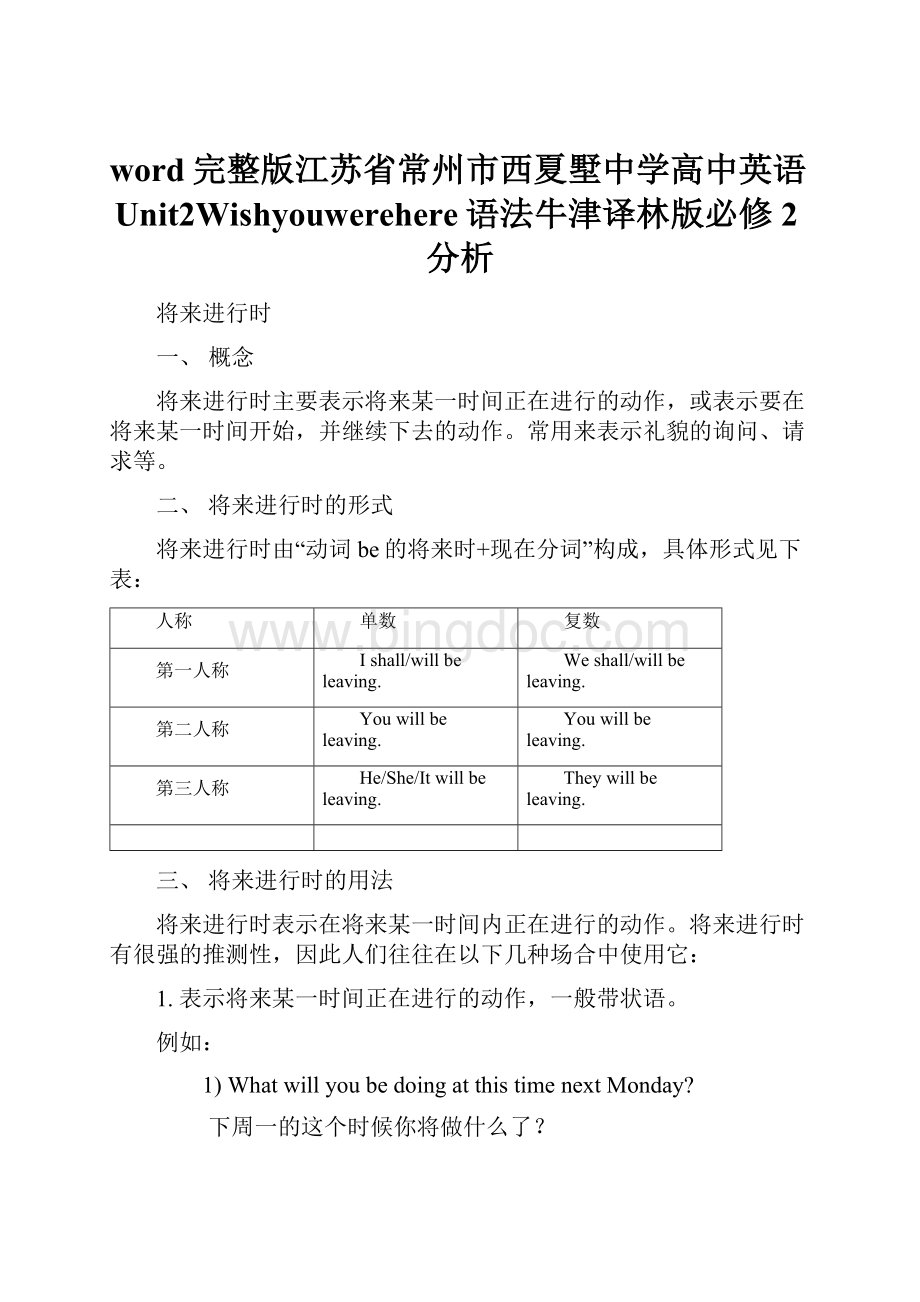word完整版江苏省常州市西夏墅中学高中英语Unit2Wishyouwerehere语法牛津译林版必修2分析.docx
《word完整版江苏省常州市西夏墅中学高中英语Unit2Wishyouwerehere语法牛津译林版必修2分析.docx》由会员分享,可在线阅读,更多相关《word完整版江苏省常州市西夏墅中学高中英语Unit2Wishyouwerehere语法牛津译林版必修2分析.docx(15页珍藏版)》请在冰点文库上搜索。

word完整版江苏省常州市西夏墅中学高中英语Unit2Wishyouwerehere语法牛津译林版必修2分析
将来进行时
一、概念
将来进行时主要表示将来某一时间正在进行的动作,或表示要在将来某一时间开始,并继续下去的动作。
常用来表示礼貌的询问、请求等。
二、将来进行时的形式
将来进行时由“动词be的将来时+现在分词”构成,具体形式见下表:
人称
单数
复数
第一人称
Ishall/willbeleaving.
Weshall/willbeleaving.
第二人称
Youwillbeleaving.
Youwillbeleaving.
第三人称
He/She/Itwillbeleaving.
Theywillbeleaving.
三、将来进行时的用法
将来进行时表示在将来某一时间内正在进行的动作。
将来进行时有很强的推测性,因此人们往往在以下几种场合中使用它:
1.表示将来某一时间正在进行的动作,一般带状语。
例如:
1)WhatwillyoubedoingatthistimenextMonday?
下周一的这个时候你将做什么了?
2)Whenhecomestomyhousetomorrow,Iwillbewritingthereport.
明天他来我家时,我将在写报告。
2.表示现在正在进行的动作,但这个动作会延续到将来。
例如:
1)Iwonderifitwillstillberainingthisafternoon.
我想知道今天下午是否还会一直下雨。
2)Ithinkthatshewillbeworkingonthisexperimentuntilnextmorning.
我想她会一直在做这个实验直到第二天早上。
3.表示预定的将来动作或对将来的预测。
例如:
1)TomorrowIwillbeflyingtoBombay.
明天我将飞往孟买。
2)Afteryoutakethemedicine,youwillbefeelingmuchbetter.
吃完药后,你会感觉好很多。
4.表示委婉的请求。
例如:
Whenshallwebemeetingagain?
我们什么时候能再见面?
5.表示原因。
例如:
Pleasecometomorrowafternoon.Tomorrowmorning,I'llbehavingameeting.
明天下午快点来。
明天早上我将有一个会议。
6.表示结果。
例如:
Stopthechildorhewillbefallingover.快阻止孩子,要不然他会摔跤的。
7.表示对将来的打算(区别于对将来的预测)
例如:
MydutieswillendinJuly,andI'llbereturningtoBeijing.
七月我将结束工作,返回北京。
过去将来时
一、概念
过去将来时的动词表示对过去某一时间来说将要发生的动作或呈现的状态。
这个时态常用在宾语从句中。
二、过去将来时用法
1.should/would+动词原形
例如:
1)HesaidhewouldbetherebeforeMonday.
他说他星期一以前将在那里。
(be动词肯定式)
2)Wehopedsheshouldnotgothenextweek.
我们希望下星期她不去。
(do动词的否定式)
注意:
这个时态是一个相对的时态,立足于过去某时,从过去的观点看未来。
在一定的语境中也可于其他从句或句子中。
例如:
1)Itwasaproblemwhetherhewouldsupportus.
他是否会支持我们还是一个问题。
2)Itwasseveno’clock.Thesunwouldsoonset.
这时是七点钟,太阳即将落山。
2.was/weregoing+动词不定式
过去将来时的这种表达形式可以表示过去曾经打算或计划准备要做的事。
例如:
1)Theytoldmethattheyweregoingtohaveapicnic.
他们告诉我他们将要举行一次野餐。
2)Weweregoingtohaveameeting.
我们曾经打算开个会。
过去将来时的这种形式可以表示过去将要发生或很有可能发生的事,但未实现的动作。
3)Iwasjustgoingtoringhimupwhensh
ecame.
我刚要给他打电话,她就来了。
(电话没打成)
有时也用was/were+coming表示过去将来时。
例如:
Shedidn'tknowwhentheywerecomingagain.
她不知道他们时候会再来。
3.was/wereabout+动词不定式表示在过去看来正要做某事。
例如:
1)Theywereabouttoleavewhenthetelephonerang.他们正要走,电话铃响了。
2)Iwasjustabouttogotobedwhenshecametoseeme.我正要睡觉,她来看我了。
4.was/were+动词不定式表示定于过去某时将要做某事。
例如:
Hewastomeetherat10onthestreet.他约定和她10点钟在街上见面。
注意:
若表示过去没有实现(或被取消)的计划,则用was(were)to+动词完成时。
例如:
Theyweretohaveleftat7lastnight.他们本来计划昨晚7点离开的。
5.would(should)+动词原形把助动词be变为过去式,把will,shall变为过去式。
例如:
1)ItoldthemthatIwouldnotgowiththem,ifitrained.
我告诉他们,如果下雨我就不和他们一起去了。
2)Hedidn’tknowhowtodoit.Whatwouldbetheirideas?
他不知道该怎么办,他们会有什么想法呢?
6.would(should)+动词原形过去将来时常可用来表示过去习惯性的动作。
此时,不管什么人称,一律用w
ould。
例如:
1)Whenevershehadtime,shewoulddosomereading.
她一有时间,总是看书。
2)IwouldplaywiththemwhenIwasachild.
当我还是孩童时,总是和他们一起玩。
现在把将来进行时与过去进行时用法归纳如下表:
将来进行时
构成
will/shallbe+现在分词
基本
用法
1)表示将来某一时间正在进行或持续的动作。
2)表示按计划或安排要发生的动作。
3)表示委婉语气,有时用将来进行时可使语气更委婉。
注意事项
1)为避免will给人误以为是表示“意愿”的情态动词,口语中表示单纯的将来时常用将来进行时。
2)条件状语从句和时间状语从句中须用现在进行时代替将来进行时。
过去将来时
构成
w
ould+动词原形/was(were)goingto/was(were)about+不定式/was(were)+不定式
基本
用法
1)woulddo表示从过去看某事将要发生。
2)用was(were)goingtodo表示过去某时计划或安排要做某事。
3)用was(were)about+不定式表示在过去看来正要做某事。
4)was(were)+不定式,表示过去计划安排将要发生的动作,语气较为正式。
注意事项
1)表示过去没有实现(或被取消)的计划,则用was(were)to+动词完成式。
2)在条件和时间状语从句中,要表示过去将来须用一般过去时代替过去将来时。
3)come,go,leave,arrive,start等动词可用过去进行时代替过去将来时。
练习
一、单项填空
1.TheBlackswithusforthetimebeing.
A.willstayB.wouldstayC.havebeenstayingD.willbestaying
2.Theplaneatthepresentspeeduntilitcrossesthemountainatabouttentonight.
A. wouldgoB.wentC.willbegoingD. goes
3.Mr.Smithwillnotbeabletoattendthemeetingtonightbecause______then.
A. hemusthaveaclassB. hewillbeteachingaclass
C. heteachesaclassD. hewillhavebeenteachingaclass
4.Iwon’tbeabletowatchtheconcertonTVtonightbecauseIhomeworkatthattime.
A.shallhavedoneB.shallbedoingC.shalldoD.havebeendoing
5.I_______mybossatthreethisafternoon.
A.shallbepickingupB.shallbepicked
C.shallhavebeenpickingupD.shallhavepicked
6.Youcan’tmissFrank.He______adarkgreensuitandayellowtiewaitingforyou.
A.iswearingB.willwearC.wearsD.willbewearing
7.----CouldyougivethesebookstoMr.Black?
----Absolutely,_______himatfiveo’clockthisafternoon.
A.IwillhaveatalkB.Ihaveatalkwith
C.IcanhaveatalkwithD.Iwillbehavingatalkwith
8.I’mafraidIwon’tbeavailablethen.I_____afriendoffatthreethisafternoon.
A.seeB.amseeingC.willseeD.willbeseeing
9.NextFridayIwillgotoanotherconcert.They____somethingbyMozartatthattime.
A.
playB.willbeplayingC.aregoingtoplayD.aretoplay.
10.---Whatareyoudoing,Jack?
---Makeamodelplane.I____itinthescienceclassat10o’clocktomorrowmorning.
A.willbeshowingB.amgoingtoshowC.showD.haveshowed
11.We_____adebateonsomeenvironmentalissuesallafternoontomorrow.
A.willbehavingB.amhavingC.amgoingtohaveD.have
12.Whatdoyouthinkyou_____atthistimenextyear?
A.willdoB.willbedoingC.areabouttodoD.do
13.---Whatwillyoudotomorrowevening?
---I_____myfavoriteprogrambetween8and11,thenIwillgoouttodrinkinmyusualbar.
A.willwatchB.amabouttowatch
C.willbewatchingD.amwatching
14.---Whenwillyoucometoseeme,Dad?
---Iwillgotoseeyouwhenyou_____thetrainingcourse.
A.willhavefinishedB.willbefinishingC.arefinishingD.finish
15.Tomsatunderatreeandseeinghisfriend,upinnotime.
A.tostandB.standingC.stoodD.wouldstand
16.I_______veryhappyifIcouldbeofsomeservicetoyou.
A.wouldbeB.havebeenC.mustbeD.canbe
17.Themeetingwastoat9o’clockbutthemanageruntiltwentyminuteslater.
A.start;didn’tturnupB.havestarted;didn’tturnup
C.start;hadn’tturnedupD.bestarted;hadn’tturnedup
18.----hecometoseeyou?
----Ofcourse,please.AndI’dratherhemethetruth.
A.Will;informB.Shall;toldC.Should;wouldsayD.Can;spoke
19.Ifthebuildingproject_____bytheendofthismonthisdelayed,theconstructioncompany_____fined.
A.willbecompleted;istobeB.tobecompleted;willbe
C.beingcompleted;willbeD.completed;was
20.----Irangyouataboutten,butnooneansweredthephone.
----Oh,thatwasprobablywhenI_______myn
eighbor.
A.visitedB.wasgoingtovisitC.wasvisitingD.hadvisited
21.BecauseIthenextday,IwenttobedearlyonSaturdayevening.
A.wasleavingB.willleaveC.hadleftD.wasabouttoleave
22.----Henry,fancymeetingyouhere.
----Oh,it’syouJack.Sorry,I______you______tome.
A.didn’tthink;werespeakingB.don’tthink;spoke
C.didn’tthink;wouldspeakD.thought;arespeaking
23.BynextsummerJohninthisfactoryforthirteenyears.
A.hasbeenworkingB.willhavebeenwo
rking
C.willbeworkingD.hasworked
24.HewillhavelearnedEnglishforeightyearsbythetimehe__________fromtheuniversitynextyear.
A.willgraduateB.willhavegraduatedC.graduatesD.istograduate
25.I_______________theofficewhenthetelephonerang.
A.wasabouttoleaveB.wouldleaveC.leftD.wastoleave
26.Accordingtotheiragreementreachedin1943,nocountry___________peacewithGermanyalone.
A.istomakeB.wastomakeC.wouldmakeD.wasabouttomake
27.Hepromisedmeifwe_______thegame,he________usaroundofdrink.
A.win;willbuyB.wouldwin;wouldbuy
C.won;boughtD.won;wouldbuy
28.Hesaidtimeandtimeagainthathe_________,butheactuallystayedwellaftermidnight.
A.isleavingB.wasleavingC.wastoleaveD.willleave
29.----Mom,Igotthefirstprizeinthespellingcontest.
----Oh,howgreat!
Daddywillbesoproudofyou.He_____you_____towin.
A.neverthink;aregoingB.neverthought;weregoing
C.didn’tthink;weregoingD.hadn’tthought;weregoing
30.Tom_________toJerryandtellhimabouthisnewschoolatonce.
A.willwriteB.writesC.wroteD.writes
二、用所给动词的适当形式填空
1.He__________(lie)ononeofthesunnybeachesinHawaiialldaywhenhespendshisholidaythere.
2.Don’tcallmebetween2:
00and4:
00thisafternoon.I________(have)antestthen.
3.Nobodyknewwhat________(happen)totheEarthinacentury’stime.
4.Mr.LeesaidhewouldgivetheCDtomeassoonashe______(return)fromCanada.
5.Whenwewereyoung,father________(take)usforaspecialtreat
onMother’sday.
6.----DidyouinviteSarahtoyourbirthdayparty?
----Sorry,Iforget.I_______(call)hernow.
7.Youhavetoputinmoreeffortif
youwere_________(pass)thetest.
8.I__________(tell)youaboutmyplan,butyoustoppedmebeforeIcouldspeak.
9.Willyou__________(use)yourcomputerthistimetomorrow?
10.I__________(close)thekitchendoorwhenalittlemousepoppeditsheadout.
三、句子改错
1.Hewastocrosstheroadwhenacarsuddenlyraceduproundthecorner.
2.Whenwewenttothewestcoastforspringbreak,wewillfindhotelnearthebeach.
3.Manyanimalswilldieofthirst
whenthe
riverwillrundry.
4.Shesaidshewasgoingtocomewhenhermothertoldhersupperwasready.
5.Areyougoingtocallthepolicewhenyoufoundyourlaptopstolen?
四、中译英
1.我正打算往河里跳时看见水里出现一条蛇。
2.下个月的今天我们将乘飞往去南美洲。
3.据报道,有一颗人造卫星将在酒泉被发射。
4.她
本打算今年暑假去欧洲旅行